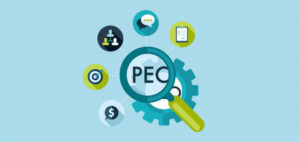
PEO Professional Employer Organization Awareness – NAPEO Survey Shows It’s Growing
A recent survey conducted by the National Association of Professional Employer Organizations (NAPEO) has shown that the awareness of the PEO industry has increased by 44% since 2018. This is a significant increase and proves the growing popularity of PEOs amongst businesses of all sizes.
But what is a PEO? We’re here to explore what a PEO is, how it works, and the benefits it can offer businesses. Keep reading.
What is a PEO?
A PEO stands for Professional Employer Organization. This is a company that provides comprehensive HR solutions to businesses.
A PEO acts as an outsourced HR department, handling everything from payroll and benefits administration to staff relations and regulatory compliance. By partnering with a PEO, organizations can focus on their core operations while the PEO handles all HR-related tasks.

Growing awareness of PEOs
The NAPEO survey showed that awareness of the PEO industry has increased by 44% since 2018. This is a significant increase and shows the growing popularity of PEOs amongst businesses of all sizes.
One reason for the growing awareness of PEOs is the increasing complexity of HR regulations. As employment laws become more complex, organizations need help to keep up. Partnering with a PEO can help businesses navigate the complicated world of HR regulations and ensure they’re staying compliant.
Another reason for the growing awareness of PEOs is the increasing demand for improved employee benefits. As the job market becomes more competitive, businesses are looking for ways to attract and retain top talent. By partnering with a PEO, businesses can offer better employee benefits packages, which can help them attract and retain great talent.

The history of PEOs
PEOs have been around for over 30 years and have evolved considerably over that time. The concept of co-employment, which is at the center of the PEO model, was first developed in the 1980s by a handful of companies that wanted to provide small businesses with access to better employee benefits packages.
By acting as the employer of record for the businesses’ employees, these businesses could leverage their combined employee base to negotiate better rates on benefits like health insurance and retirement plans.
As the PEO industry grew, it began to offer a broader range of HR solutions, like payroll processing, tax filings, and regulatory compliance.
Today, PEOs provide comprehensive HR solutions to businesses of all sizes and industries. The PEO industry has also become more regulated, with many states requiring PEOs to be licensed and registered with regulatory agencies.

How does a PEO work?
When a business partners with a PEO, the PEO becomes the employer of record for the organization’s employees.
This means that the PEO is responsible for:
- Payroll processing
- Tax filings
- Benefits administration
- Other HR-related tasks
The business, however, remains responsible for managing its staff’s day-to-day activities, such as hiring, training, and performance management.
The PEO and the business enter a co-employment relationship, meaning both parties share specific employer responsibilities. The PEO handles the administrative tasks associated with being an employer while the company keeps control over its employees and their job responsibilities.
Types of PEOs
There are several different types of PEOs, each with strengths and weaknesses.
National PEOs, for example, are large companies that provide HR solutions to organizations across the country. They typically have a broad range of expertise and can offer a comprehensive suite of HR solutions. However, national PEOs may not be as responsive to the unique needs of organizations in specific regions or industries.
Regional PEOs, on the other hand, are smaller companies that focus on serving businesses in a particular geographic area. They may have a more customized approach and be better able to understand the unique challenges facing businesses in that area. However, regional PEOs may not have the same level of expertise or access to resources as national PEOs.
Industry-specific PEOs are another type of PEO that focuses on serving businesses in a particular industry, like healthcare or hospitality. These PEOs may have a deep understanding of the specific HR challenges facing firms in that industry and be able to offer bespoke solutions. However, they may be less suited to businesses outside of that industry.
Benefits of partnering with a PEO
There are several benefits to partnering with a PEO.
1. PEO can provide businesses with access to better employee benefits packages. PEOs have access to group buying power, which means they can negotiate better rates on benefits like health insurance, retirement plans, and workers’ compensation insurance.
2. Partnering with a PEO can help organizations streamline their HR processes. A PEO can handle payroll processing, tax filings, and other administrative tasks more efficiently than an in-house HR department. This can free up the business’s resources, allowing them to focus on its core operations.
3. Partnering with a PEO can help organizations stay compliant with employment laws and regulations. PEOs have HR professionals who are well-versed in employment laws and regulations. By teaming up with a PEO, businesses can ensure that they’re meeting all legal requirements and avoiding expensive penalties.
The challenges of PEOs
While PEOs offer many benefits, there are also some challenges that organizations should be aware of before partnering with a PEO.
One challenge is the loss of control over certain HR functions. When a business partners with a PEO, it loses some control over HR functions such as payroll processing and benefits administration. While this can be a relief for businesses that need more resources to manage these functions in-house, it can also be challenging for companies that are used to having complete control over these functions.
Another challenge is the potential for miscommunication or misunderstandings between the PEO and the business. Since the PEO acts as the employer of record for the business’ employees, there may be confusion over who’s responsible for certain HR functions.
Clear communication and a detailed contract can help reduce this risk.
Finally, some businesses may find that the cost savings and benefits of partnering with a PEO aren’t significant enough to justify the cost. While PEOs can be cost-effective for many organizations, they may not be the best solution for every business.
It’s essential for businesses to carefully evaluate their HR needs and the fees and benefits of partnering with a PEO before deciding.
PEO vs. traditional HR outsourcing
PEOs and traditional HR outsourcing are two different approaches to outsourcing HR functions. Traditional HR outsourcing usually involves outsourcing specific HR functions, such as payroll or benefits administration, to a third-party provider. This can be a cost-effective solution for organizations that only need help with particular tasks.
PEOs, on the other hand, provide an exhaustive suite of HR solutions, including payroll processing, tax filings, benefits administration, and regulatory compliance. By partnering with a PEO, businesses can outsource all their HR functions to a single provider. This can be a more convenient and cost-effective solution for businesses that require help with multiple HR functions.
PEOs and small businesses
PEOs can be particularly beneficial for small businesses, which may need more resources to manage HR functions in-house. By teaming up with a PEO, small businesses can access the same level of HR expertise and employee benefits packages as bigger businesses. This can help companies to attract and retain top talent, stay compliant with employment laws and regulations, and focus on their core operations.
Additionally, PEOs can help small businesses scale more efficiently. As an organization grows, its HR needs may become more complex. By partnering with a PEO, small businesses can easily introduce new employees, expand into new states or regions, and access additional HR services as needed.
The future of PEOs
The PEO industry is likely to continue to evolve in the coming years as technology advances and employment laws and regulations change. One trend that’s likely to continue is integrating digital solutions into PEO services. For example, AI-powered HR chatbots could help businesses automate specific HR tasks and provide more personalized services to staff.
Partnering with a PEO: A promising solution for businesses looking to streamline HR functions and stay compliant
The NAPEO survey shows that the awareness of the PEO industry is growing. Businesses of all sizes are recognizing the advantages of partnering with a PEO, including access to better employee benefits, streamlined HR processes, and compliance with employment laws and regulations.
As the business world becomes more complex, PEOs are becoming an increasingly popular choice for organizations looking to streamline their operations and focus on their core competencies.
Sources
- NAPEO SURVEY SHOWS AWARENESS OF PEO INDUSTRY IS UP 44% SINCE 2018, PR News Wire, February 2023
- Professional Employer Organizations: Everything you need to know about PEOs, Rippling, 2023
- PEO benefits: 7 advantages of using a PEO for your business, Insperity, 2023

 Our HR solutions experts can recommend the right mix of HR outsourced services to make your entry into Canada easier.
Our HR solutions experts can recommend the right mix of HR outsourced services to make your entry into Canada easier.  Pivotal Employment Management Services co-hires your workforce, simplifying entry of your business in Canada.
Pivotal Employment Management Services co-hires your workforce, simplifying entry of your business in Canada. 
















Your Inbox Is Not a Productivity Tool